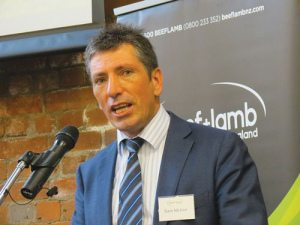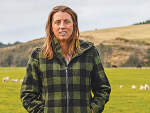Beef + Lamb New Zealand says it is working hard to ensure that the farming sector is valued by all New Zealanders.
Chief executive Sam McIvor told the organisation’s annual meeting in Timaru that farmers feel respect for the rural sector has been eroded.
“Most commonly we see it in the media, whether its animal welfare, climate change, environmental degradation, alternative proteins or feedlots – there is no doubt that farmers are being targeted.”
McIvor told the meeting that he sympathises with farmers in this, having personally been for three years the face of the NZ pork industry during a media and activist animal welfare onslaught.
“It feels like crap to be constantly criticised. We are working hard to restore [your] pride.”
He said a BLNZ key objective – to be valued by all New Zealanders – speaks to farmer pride and to restoring that pride, and he believes acting more promptly on issues that matter would help achieve this goal.
“Last year, we launched the sector’s environment strategy. Not only has it put us as a leading domestic industry, but is getting global recognition for addressing the issues,” McIvor claims.
“Last year we released our biodiversity report that shows that you, as sheep and beef farmers, have 1.4 million ha – 24% of NZ’s native vegetative biodiversity on your farms. Now we’re assessing the potential carbon sequestration; that’s getting ahead of the game putting you in a position to call the shots.”
McIvor says BLNZ is putting in place robust measurement of the impact the organisation is having on farmers’ profits, the ability of their communities to thrive and whether or not the ‘dial’ is shifting in Government and public support.
“We talk to farmers and hear your issues, we look to the markets, societal and government perspectives and we consider both the risks and returns to farmers -- that is, the impact on your bottom line.”
He says BLNZ’s priorities are:
- Unlocking market potential
- Enhancing our environmental performance
- Supporting farming excellence
- Government and public insight and engagement
- Building a great organisation farmers can be proud of.
“Two key activities are overarching and they will touch every part of the industry and BLNZ,” McIvor added. “The first is activation of Taste Pure Nature, our origin brand. The second is the implementation of the environment strategy.
“Both of these are urgent: in Taste Pure Nature an opportunity knocks; in the environment strategy both risk and reward knock. The risk is regulatory and reputational.”
He warned that the Government has a large policy agenda with potential to negatively impact the meat industry.
“We are strongly advocating a farmers’ perspective based on strong science and fact-based analysis; we are good at this and we are having an impact,” McIvor said.
“We’re turning our focus to the wider public. The social licence to farm is a real issue. We need to understand the perspectives of the public and of non-governmental organisations; they influence policy and buy our products.”











